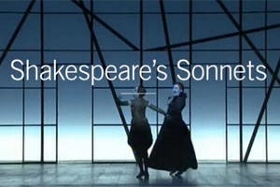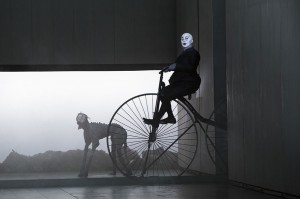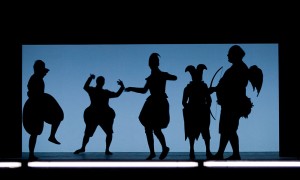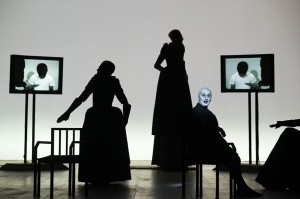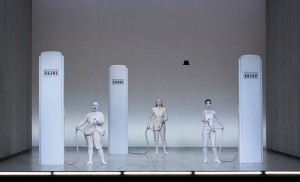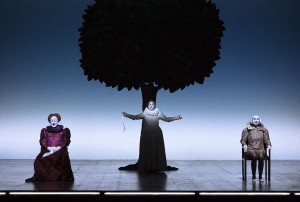SHAKING UP SHAKESPEARE
Shakespeare wrote 154 sonnets, only 25 of which are included in Berliner Ensemble’s Shakespeare’s Sonnets. But that is more than enough to make for an exciting theatrical event. What’s more, the sonnets are accompanied by Robert Wilson’s surreal staging and a score by singer/songwriter Rufus Wainwright. All this should make for a festival of sight and sound. Still, there are a few flies in the ointment.
Most of the sonnets are recited in German, which means for English translations the audience must rely on supertitles projected above the stage. Often these flash by so quickly that it’s hard to grasp the meaning of the words before they disappear. And when the audience is reading the supertitles, it is not looking at what is happening on stage.
But then again, the scenes onstage appear to have little connection to Shakespeare’s sonnets; it often seems two separate plays are happening simultaneously. Selected by Berliner dramaturge Jutta Ferbers, it is not clear why she chose these sonnets, or what determined the order in which they are presented.
Certainly there are a few familiar characters: a regal Queen Elizabeth with her flaming red hair, a chubby Cupid, the mysterious Dark Lady’”all of them played in drag. But it’s hard to understand what they are doing or why they are doing it.
One of the most accessible elements is Wainwright’s music. Part classical, part pop, one hears strains of Jimmy Hendrix in a guitar solo, and Tom Waits and Kurt Weill throughout. (The strains of Weill are especially apropos given the German theatre company was established by playwright Bertolt Brecht.) At times the performers sing the sonnets. Other times the music plays in the background while the actors speak the words.
But what to make of those gas pumps. Or the skeleton of a car wrapped around a pole. Your guess is as good as mine.
Nevertheless, there is something quite intriguing about this production. Andreas Fuchs and Ulrich Eh’s otherworldly lighting, the play of light and shadow on Wilson’s spare set, and Jacques Reynaud’s garish costumes and makeup all transport the viewer into a fantastical world where the imagination rules. Perhaps the best way to enjoy Shakespeare’s Sonnets is by immersing oneself in the experience and not trying too hard to figure out the why and wherefore.
photos by Lesley Leslie-Spinks
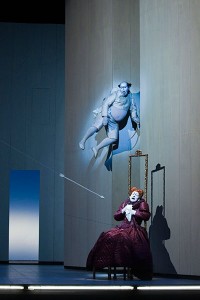 Youtube clips: Sonnet 20; Sonnet 29;
Youtube clips: Sonnet 20; Sonnet 29;
Sonnet 66; Sonnet 71
Shakespeare’s Sonnets
Berliner Ensemble
Brooklyn Academy of Music
Howard Gilman Opera House, 30 Lafayette Ave.
scheduled to end on Oct. 12, 2014
for tickets, call 718-636-4100 or visit www.BAM.org
